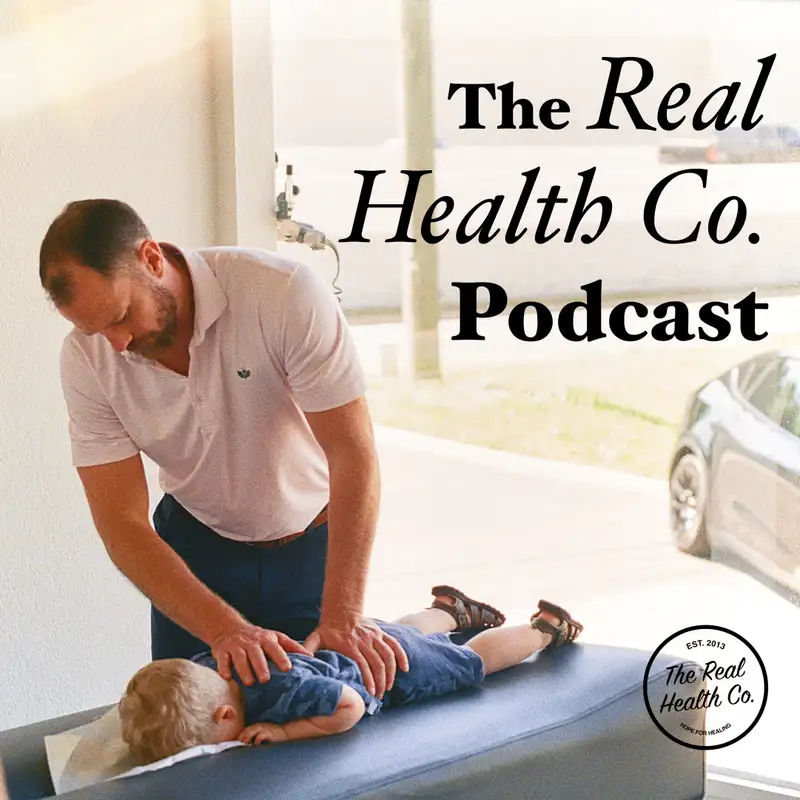 Episode 133
Episode 133
· 12:00
Welcome back to another episode of the Real Health Podcast. We aim to add as much value in your health journey as you look to scientific based evidence in helping you live a healthier outcome. And it's not just for you, it's for your entire family. And today we'll speak to families for sure. We're heading into fall and winter where viral loads increase.
Dr. Barrett:And so we're gonna just help you process when your child is sick, what are some strategies to help them overcome that illness maybe a little bit faster. Week one, last week, we talked about prevention. Today, we're gonna talk about some recommendations to help their little bodies heal faster. But this applies to adults as well. And so when we look at how viral illnesses kind of spike in colder months, the factors are there's lower humidity, there's more indoor gatherings, so there's just more viral loads being passed around.
Dr. Barrett:There's weakened immune system with less sun exposure, maybe more sugar consumption during holidays, and viral loads survive a little bit longer in cold air. And so when you look at kids, they may catch colds annually often six to eight times per year. So optimizing recovery strategies is not only practical, but it's crucial. If you can reduce the episodes at which, the length of the episodes and the episodes at which they get sick, then we can really help build immunity. If we're caught in an antibiotic cycle, then it can be tough to kind of get out of that.
Dr. Barrett:So let's talk about supplements. Let's talk about supplements for recovery. What do we use in the house? And one of my go to favorites is vitamin C. And when comes to supplements, remember they're not cures, right?
Dr. Barrett:They're providing the immune system with support. So when we look at vitamin C, about one thousand milligrams a day can shorten duration and lessen severity of colds by fifteen percent. That's significant. That's extremely significant. So just vitamin C alone, about one thousand milligrams a day can shorten severity and symptoms by 15.
Dr. Barrett:Why not consume it, right? It has really all upside, no downside. And they make it so affordable. You don't need anything fancy. Just straight ascorbic acid is all that you're looking for.
Dr. Barrett:The chief form of ascorbic acid is all you need to help boost vitamin C levels. It is best taken at onset and early during the illness, okay? Has a better effect on the body. Vitamin D. When we look at vitamin D, lower vitamin D levels are associated with higher risk and severity of respiratory infections.
Dr. Barrett:When you look at a study found those that taking vitamin D three were 42 percent less likely to get seasonal flu. Now here's the disclaimer, the medical disclaimer. It's really important that you don't supplement vitamin D randomly. Work with your practitioners to know exactly how many IUs of vitamin D are needed in an adult, in a child, because not everyone needs it. So it's important to keep in mind that it is dose dependent upon age and you gotta make sure you're checking the vitamin D levels before you start just randomly supplementing with it.
Dr. Barrett:It's a hormone, pro hormone. It accumulates, they consider it a fat soluble vitamin, but really it has more of a pro hormone effect on the bias. So it's really important to make sure we got it dialed into proper range. But it's incredible what the evidence shows with vitamin D. Another big one is zinc.
Dr. Barrett:I'm a big fan of zinc. Zinc, especially lozenges, can shorten cold duration, especially if it's started within twenty four hours of symptoms. When we look at zinc, if you consume it and maybe it's a chewable or lozenge, and you have a very metallic taste in your mouth, it's probably because your zinc levels are adequate. Zinc is is is something that when you're at when your levels are adequate, you'll taste more of a metallic flavor. But when you have very little zinc levels, you actually it doesn't taste like anything.
Dr. Barrett:So someone in the house may say, "hey, this tastes like metal". And the other person's like, "I don't taste a thing. Like, it just tastes like a cherry flavored lozenge." Well, the difference between the two is once zinc levels are optimal and the other ones are very depleted. You can actually do a zinc challenge taste test, which is aqueous or water solution of zinc to know exactly what your levels are at and how to supplement them properly.
Dr. Barrett:But zinc can definitely reduce and shorten duration of colds. One of the herbs that we use and suggest in the office is elderberry. Elderberry again, when taken earlier has greater effect. And so we see that with elderberry it has a great immune support. Elderberry in particular helps improve killer T cells and so can help shorten duration.
Dr. Barrett:So those are some of the main ones that we use. One of my favorite products on market is called Immuno Berry. And Immuno Berry has elderberry and has something else in it, which are mushroom extracts, call them beta glucans. And beta glucans have a phenomenal effect on immune system regulation. They really act as like an adaptogen where they can help improve immune function if it's weakened or calm down an overstimulated immune system.
Dr. Barrett:But beta glucans or mushroom extracts, turkey tail for instance, reishi mushroom are fantastic as well. And when anytime you can get a formulation like Immuno Berry that has elderberry, beta-one-three glucan in it, then you're really going to help support it from multiple angles. And so that would be my supplement recommendation. There's an antiviral supplement that we use a lot called BioPhys Immune from Designs for Health, that's another fantastic product that has more of the C, the zinc, the quercetin, the rutin in it, some of those natural anti inflammatories that can help big time, again, shorten the duration of viral loads. So BioPhys Immune, elderberry, those are kind of like your one two punch for sure.
Dr. Barrett:What about some other strategies? Outside of supplementation, what else do you want to do? Well, if it's respiratory involved, I really love using a nebulizer. Nebulizing the lungs just with saline solution, right? Just straight salt solution.
Dr. Barrett:Obviously it's got to be a bacteriostatic water, right? Just perfectly clean aqueous solution. But when you do salt water in a nebulizer, that salt solution actually has a natural anti inflammatory effect. Humidifiers are great with respiratory illnesses. When you look at nebulizing, it's great for asthma, bronchiolitis, wheezing episodes.
Dr. Barrett:And saline nebulizers, salt solution based nebulizers, just soothe the irritated airways. It thins the mucus helps, gets things up, and you can do this in younger children. So it's a great option. When you look at saline sprays for instance. Not all kids are going to take a nasal irrigation, like a neti pot.
Dr. Barrett:Now those are fantastic for adults making sure again that the water solution is perfectly clean, sanitized, you're not just getting out of your tap water. It's a major important component to nebulizing. Or with irrigation. With kids though, another option is something we call Little Remedies. Little Remedies has these nasal saline sprays, and there's other brands on the market that you just missed their nasal pathway.
Dr. Barrett:And it really helps again, calm down inflammation, thin the mucus, get them draining. You just don't want it all congested staying in that nose or staying in that throat. So very practical application when you look at humidifiers or nebulizers. There are some other strategies for sure. Like when you look at adults, adding glutathione has been very, research has shown it being lung protective, so it's great for pulmonary function.
Dr. Barrett:Any antioxidant like N acetylcysteine or glutathione, or even natural polyphenols like turmeric extracts are great to use to reduce inflammation and to allow the body to heal. There's fat soluble vitamins outside of D. There's vitamin A that can be used as well. But again, when you get into fat soluble vitamins, very important to work with a practitioner so you know loading the dosing because it is so dependent upon the patient and labs. So you got to make sure you're working with your healthcare practitioner.
Dr. Barrett:But if you look at the season going in and you address it pretty quickly, then you can definitely shorten the duration and severity of a lot of viral loads. So vitamin C, vitamin D, elderberry, all those are great. Zinc is fantastic. Humidifiers put throughout the room. You can be using nebulizing and saline solution irrigation.
Dr. Barrett:All of those things are going to help reduce the time duration of the illness. But fundamentally when it comes down to prevention is better than treating. So if this is the first time you heard my episode, make sure you go back to the previous episodes so you can talk through prevention. As we talk through chiropractic care and when you're sick, don't be consuming sugar. Sugar is an immune suppressant, so we don't want to be consuming sugar.
Dr. Barrett:We want to be consuming broths when we're unwell. Broths are very nurturing and nourishing to our bodies when we're unwell. Hydration is so important, so making sure that you're consuming electrolyte rich water when you're not doing well. Getting out and actually moving your body. There's research that shows the more, like when you go out and even when you don't feel well and you walk, just walking helps pump the lymphatic system and actually helps you recover a little bit faster.
Dr. Barrett:There is a effect of mild, very mild exercise when unwell to help your body recover and heal a little bit faster. So when we look at these viral loads that are coming into our environment, making sure you kind of have a wellness cabinet ready to go is so important. So I hope today's episode was valuable for you. As always, if you need anything, feel free to reach out to our office at The Real Health Co, and we'd be happy to add value to any area of your life that you need. Thanks for listening to another episode of The Real Health Podcast.
Dr. Barrett:Our passion is to add value to your healthcare journey. Anything that we do, we want to do it within a community to help as many people as possible. Thanks for listening to episodes of the Real Health Podcast. If you could like, if you could subscribe, and you can share, it would help our mission to reach as many people with real health that produces real results for real people.

Listen to The Real Health Co. Podcast using one of many popular podcasting apps or directories.